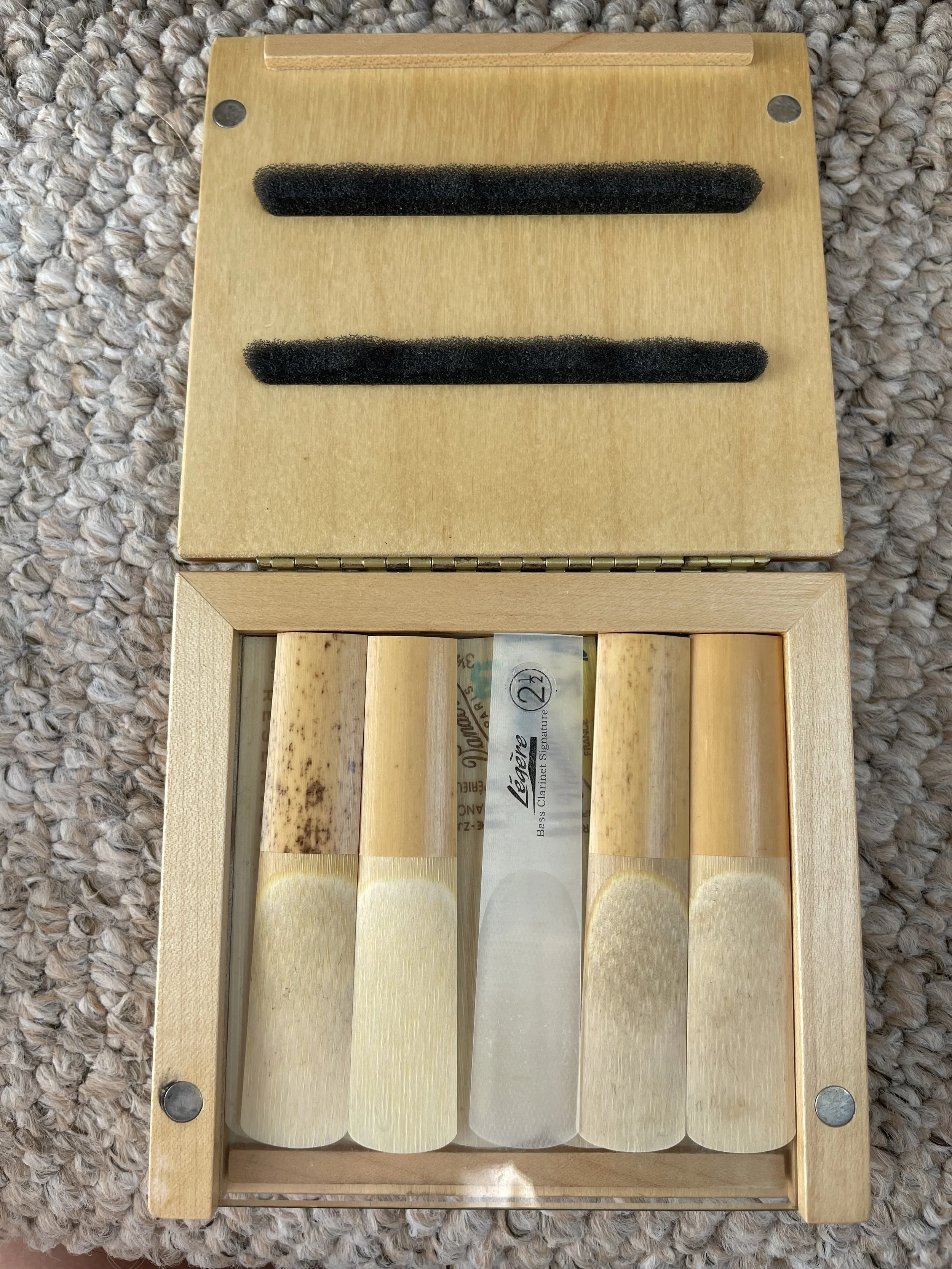REEDS
Reeds can be frustrating, unreliable and expensive! Just like clarinet/saxophone reeds, there are many different types - which can be quite daunting, and trying them all becomes an expensive exercise! Bass clarinet reeds also tend to get waterlogged more quickly (and therefore will warp), so care needs to be taken to not over play them.
So let me simplify this for you...
Vandoren Blue Box: these are the reeds I’d recommend for most beginner - advanced bass clarinettists. They are consistent and easy to use. If you’re completely new to the instrument I’d say starting with a 2 or 2.5 strength, working up to a 3.
Vandren V12: these are the reeds I currently play on. They last slightly longer than the Blue Box as they have a thicker tip, and I get more depth to the sound. *these reeds come up slightly softer than the Blue Box - a strength 3 V12 is the equivalent of a 2.75 Blue box.
D’Addario Reserve: these are good consistent and reliable reeds, not as widely available in shops in the UK yet. D’Addario claims these reeds are perfect for solo and chamber music, as they able you to achieve a flexible tone. *in terms of strength, the D’Addario Reserve tends to line up with the Blue Box Vandoren - being about 1/4 size more resistant than the V12.
I would highly recommend starting on the Vandoren Blue Box, and then trying one (or both) of the others if you crave something slightly different.
Synthetic Reeds
If you are playing the bass clarinet for long periods of time, outside, in very hot climates or just need something you can 100% rely on - synthetic reeds can be a good option. You’ll see a variety of different types of synthetic reeds online and they tend to be like marmite (you either love them or hate them). But before you rely on someone else’s opinion, try them! There are a few different brands, but the most popular by far are Légère.
I used Légère reeds for the entirety of my masters degree because my principal study teacher used them, and they went really well with my then, crystal mouthpiece.
Légère Reeds: there are two types - European Cut & Signature. I’ve tried both and preferred the European Cut. These are more expensive than cane reeds, but from my experience can last up to a year or more if looked after! Légère Reeds also come in 1/4 strengths, so you’re likely to find one that suits you in terms of resistance.
The signature reeds are slightly more resistant than the European cut. A Blue Box Vandoren 3 is about equal to a Légère European Cut 3, but for the same resistance in the Signature you’d want a 2.75.
‘Playing in' Reeds
Different players do different things to ‘play in’ their reeds. For example, some soak reeds for a day before they use them. I say just keep it simple!
When opening a box of reeds: I'd get a few new reeds out of the packet, play on them for short bursts of time (ie. 15 mins) and then rotate them around - just so that you don’t over-play and trash a completely new reed. I always date my reeds so I know how old they are, and number or stamp them in some way. Why? If I find a really AMAZING reed, I can find it when I need it.
Some people keep a Reed Diary - noting down the labelling of the reed and the characteristics.
Working on Reeds
You may have seen videos of people ‘working on’ reeds - meaning they can file reeds down if they are too resistant or stuffy. To get this right is like a fine art, although once you understand it you can make use of every single reed you purchase.
You can use fine sand paper to even out a reed, or make it less resistant - but if you are truly interested in understanding how to ‘work on’ reeds, I’d take a look at Reed Geek’s website and social media (I have a “Universal” reed geek and it’s far more precise than sand paper - but quite pricey!).
Storing Reeds
One of the most important pieces of kit to have is a good reed case. I make sure my ‘good’ bass clarinet reeds are stored in a case with a flat pane of glass in the middle - this ensures the reeds dry on a clean, flat surface which helps to prevent warping. I got my reed case from Howarth (London) a few years ago, and I absolutely love it.
Depending on where you live - it can be helpful to look into a humidity controlled reed case - although I don’t need to use this in the UK so I can’t comment too much on this.
Bass Clarinet reed cases can sometimes be hard to find or expensive - Tenor Sax reed cases work too!
